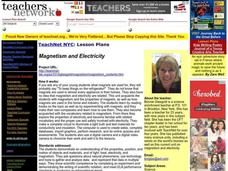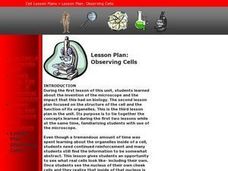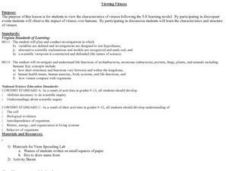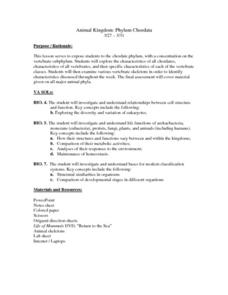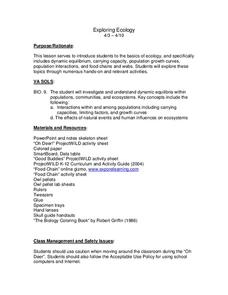Curated OER
Food Energy
Students compare the energy value of traditional foods eaten by indigenous people with those of modern commercial foods. They use a calorimeter to measure and calculate the amount of stored energy in various food types, and identify the...
Curated OER
Mining Simulation
Eighth graders put their knowledge of rocks and minerals into perspective by seeing how minerals can be mined and the difficulties and costs of mining. They explore the environmental impacts of mining.
Curated OER
Genetics the Easy Way
High schoolers use recyclable trash to construct a Recycle Critter family. They calculate the probability of the phenotype of the offspring that two heterozygous parents produced.
Curated OER
Magnetism and Electricity
Learners demonstrate a comprehension of the properties, position, and motion of objects and materials, and of light, heat, electricity, and magnetism. They use materials to assemble an electric circuit and test materials, including...
Curated OER
Design and Function of Native Watercraft
Students design clay boats and test their floating ability. They sketch and record each test different boat designs. They compare their designs to those of native Inuit vessels by looking at images and attempting to determine the...
Curated OER
An Egg-cellent Osmosis Experiment
High schoolers investigate the problem of osmosis by conducting an experiment. They use eggs with the shells dissolved to tell whether fluid can move across the membranes. The experiment provides high interest for all kinds of students...
Curated OER
World of Protists
Students observe a jar of pond water and predict how much life they think exists in the jar and watch a "Bill Nye: The Science Guy" video regarding protists. They participate in an online virtual pond dip where they begin to familiarize...
Curated OER
A Matter of Fact
Third graders define matter as anything that takes up space and has mass, recognize, through experimentation and observation, that matter exists in three forms, including solid, liquid, and gas, and discuss characteristics of each form...
Curated OER
Viewing Viruses
Students view the characteristics of viruses following the 5-E learning model. By participating in discrepant events Students observe the impact of viruses over humans. By participating in discussion students examine the characteristics...
Curated OER
Plant Classification
Students share with the class how they think plants are classified and are assessed on their prior knowledge. They use a packet to complete throughout the week at their own pace, which includes various activities to familiarize...
Curated OER
Amphibians-Frog Dissection
Students compare the anatomy of a fish to an amphibian and that of an amphibian (frog) to a human. They complete a virtual frog dissection to gain some experience prior to the real dissection.
Curated OER
Capacitors
Students explain the concepts of charge storage and how a capacitor works. They construct a capacitor and measure the stored charge using the appropriate equipment and measurements. They also demonstrate capacitance and how it can be...
Curated OER
Nuclear Fleas
Seventh graders distinguish characteristics of living things and identify the importance of careful observation. They identify five things that are not alive, but display characteristics of life and list five things that are alive, but...
Curated OER
Introduction to Dissolved Oxygen and Demonstration of a Simple Test Procedure
Young scholars explain the importance of dissolved oxygen in water ecosystems. They describe the aquatic oxygen cycle and the effect of water pollution on oxygen. They make observations, collect data and draw a conclusion.
Curated OER
Genetically Modified Foods
High schoolers explain what genetically modified foods are and how they are created. Students use appropriate vocabulary to describe and effectively discuss the benefits of, and potential risks of, genetically modified foods.
Curated OER
Basic Electric Circuits
Students calculate the resistance across a bank of resistors in a series, parallel and combined circuit. Using new vocabulary words, they define and describe them in a scientific manner. After stating Ohm's Law, they solve electrical...
Curated OER
Use of Digital Cameras
Students make observations of frogs by taking pictures of a frog and writing about its structual and behavioral characteristics. They insert a photo in Word and add text boxes and arrows for labeling.
Curated OER
Animal Kingdom: Phylum Chordata
Learners use a dichotomous key to classify various vertebrate jar speciments into classes. They examine the speciments for general characteristics of each class and fill in a corresponding chart and then complete a few final assessment...
Curated OER
Determination of the percentage of Acetic Acid in Vinegar
Students determine the concentration of acetic acid when the concentration of the base with which is titrated is known. They investigate how to weigh a sample using the balance, measure volumes using graduated cylinder, explore the...
Curated OER
Exploring Ecology
Students explore the basics of ecology through numerous hands-on and relevant activities. They participate in an online food chain demonstration, which explores food web dynamics. They dissect owl pellets, examine the prey's bones, and...





